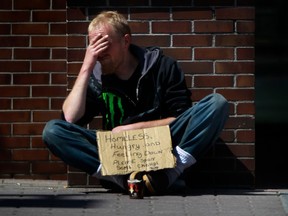Growing problems of addiction and homelessness mean we should consider creating a non-police crisis team and a supportive housing hub.
Published Jul 11, 2023 • Last updated 10 hours ago • 3 minute read
 The homelessness crisis caused Ottawa to declare a citywide emergency in 2020. Photo by Tony Caldwell /Postmedia
The homelessness crisis caused Ottawa to declare a citywide emergency in 2020. Photo by Tony Caldwell /Postmedia
What does it mean to feel safe in your community? The answer to that question can mean very different things depending on who you are and how you live.
Advertisement 2
This advertisement has not loaded yet, but your article continues below.
THIS CONTENT IS RESERVED FOR SUBSCRIBERS ONLY
Subscribe now to read the latest news in your city and across Canada.
Exclusive articles from Elizabeth Payne, David Pugliese, Andrew Duffy, Bruce Deachman and others. Plus, food reviews and event listings in the weekly newsletter, Ottawa, Out of Office. Unlimited online access to Ottawa Citizen and 15 news sites with one account. Ottawa Citizen ePaper, an electronic replica of the print edition to view on any device, share and comment on. Daily puzzles, including the New York Times Crossword. Support local journalism.
SUBSCRIBE TO UNLOCK MORE ARTICLES
Subscribe now to read the latest news in your city and across Canada.
Exclusive articles from Elizabeth Payne, David Pugliese, Andrew Duffy, Bruce Deachman and others. Plus, food reviews and event listings in the weekly newsletter, Ottawa, Out of Office. Unlimited online access to Ottawa Citizen and 15 news sites with one account. Ottawa Citizen ePaper, an electronic replica of the print edition to view on any device, share and comment on. Daily puzzles, including the New York Times Crossword. Support local journalism.
REGISTER TO UNLOCK MORE ARTICLES
Create an account or sign in to continue with your reading experience.
Access articles from across Canada with one account. Share your thoughts and join the conversation in the comments. Enjoy additional articles per month. Get email updates from your favourite authors.
For many of us, it’s the right to walk through a city park without being harassed. For the youth I met from a drop-in centre on Somerset Street, it’s the ability to wait for a bus and not be exposed to racist taunts. And for my neighbours experiencing homelessness, it can mean finding a place to rest that is sheltered from the elements.
Article content
When I held open office hours a few weeks ago at a coffee shop on Elgin Street, community security was the number one issue people wanted to talk about. And I will be the first to admit that downtown Ottawa has changed since the advent of the pandemic, in ways that are deeply troubling.
The economic downturn in the core, triggered by the shift to remote work, has led to more empty storefronts and fewer eyes on the street. Inflation and the rising cost of food have led to record food bank use all over our city. And out-of-control rents have exacerbated a homelessness crisis that caused Ottawa to declare a citywide emergency in 2020.
This advertisement has not loaded yet, but your article continues below.
Article content
I had been hearing about a particular alley in Centretown where people with active addictions have been sleeping rough, so I decided to check it out for myself. When I arrived, I found mattresses surrounded by garbage, needles and piles of human feces. The case worker from my office found similar conditions in a condemned rooming house in another part of the ward, where desperate people had been squatting with no electricity or running water. As we worked to try to find housing for those particular neighbours, one woman died of fever and heat exhaustion on a day when the temperature spiked to nearly 40 degrees.
None of this is acceptable. Human beings should not be defecating outdoors, sleeping in alleyways or dying in condemned buildings in our city. People with active addictions and mental health challenges deserve support, care and a safe place to live. And all of us deserve to move freely and safety through our downtown core to work, shop and play.
This advertisement has not loaded yet, but your article continues below.
Article content
While our community police resource officer has been helpful and empathetic, the reality is that these tremendous challenges will not be solved by policing alone. Front-line services must meet the real and growing needs in our city. Which is why I am pushing for two initiatives that will be discussed at Wednesday’s city council meeting to be expedited and launched as soon as possible.
One is a new non-police crisis line and outreach team: an alternative to calling 911 when we witness people struggling with overdoses or mental health challenges. The other is a new supportive housing hub: homes with built-in resources for people who need extra help to transition from homelessness into independent living. Both projects could be profoundly transformative for our vulnerable neighbours and prevent many of the crimes of desperation that are motivated by unmet social needs.
I know that I cannot alleviate the security concerns in my neighbourhood by acting alone. But with the support of council, I believe that we could be on the road to beginning the systemic change that will lead to a safer city. For all of us.
Ariel Troster is the city councillor for Somerset Ward in Ottawa.
>>> Read full article>>>
Copyright for syndicated content belongs to the linked Source : OttawaCitizen – https://ottawacitizen.com/opinion/troster-a-better-approach-to-addressing-safety-in-downtown-ottawa










